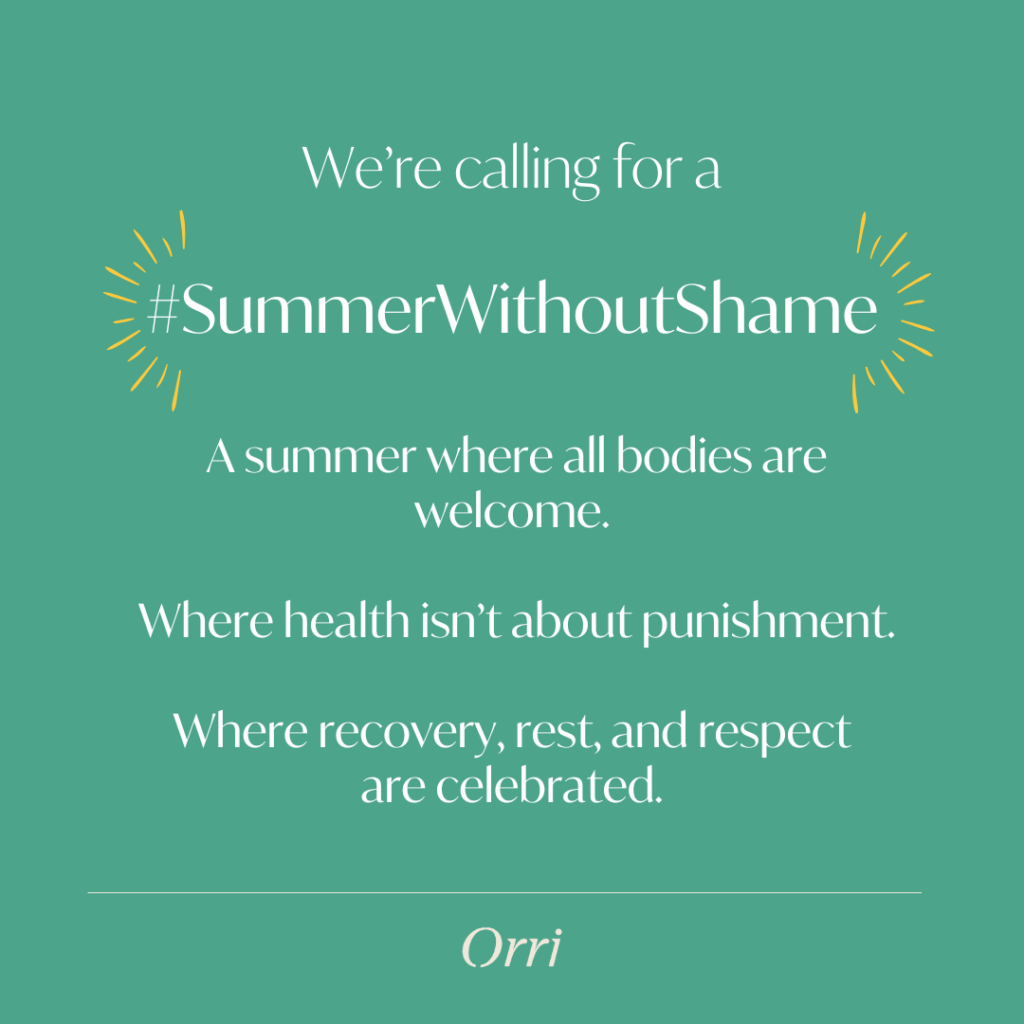By Sophie Killip – 02/07/25
Coping with body image and routine disruption for recovery in a season that demands perfection
Summer isn’t always the best season of the year. For those recovering from or living with an eating disorder, it can be one of the most challenging. Summer often demands visibility, spontaneity, and an expectation to always feel happy.
It asks you to be carefree when you’re really just trying to hold things together.
It asks you to wear less when you might feel safest wearing more.
It asks you to be relaxed while you’re actually fighting against deeply ingrained, unhelpful patterns.
The structure that supports recovery – planned meals, steady routines, and safe environments – is often disrupted by holidays, social events, and increased body-focused conversations.
These challenges go beyond food or appearance; they touch on identity, boundaries, and the conflict between fitting in and staying well.

The “summer body” pressure: more harmful than healthy
This season also amplifies the messages of diet culture and narrow beauty standards, which often equate worth with thinness and health with appearance. For those in recovery, this creates uncomfortable dissonance – the desire to heal while being surrounded by values that undermine that healing. Yet every act of self-compassion, every moment of rest, and every boundary held is a quiet resistance to a culture that expects people to minimise themselves.
Why summer is so challenging in eating disorder recovery
Healing doesn’t follow the calendar or shift with the seasons. It’s a continuous journey that moves at its own pace, regardless of the weather or social pressures. Summer can bring unique challenges, making it tempting to step away from recovery. But taking a break doesn’t just affect the present – it can create difficulties your future self will have to navigate.
That’s why creating intentional spaces this summer to support recovery is so important. Whether it’s maintaining small routines, setting boundaries, or reaching out for support, these acts keep the journey moving forward. Recovery is a daily choice, and each small commitment builds resilience and freedom that lasts beyond the season.
Recovery is still possible this summer. Even amid the noise and disruption, there is space for care, connection, and progress. Summer can offer glimmers of light and chances to nurture freedom, joy, and self-trust in meaningful moments.
5 therapist-informed ways to support eating disorder recovery during summer
Most summer advice is full of easy tips: “Wear what makes you feel good!” “Unfollow accounts that trigger you!” While these are valid, they often skim the surface. Here are some deeper, therapist-informed considerations:
1. Stability is sacred: create micro-routines
When everything feels unstructured, micro-routines can ground you. Maybe it’s a morning thought dump followed by setting daily intentions. Maybe it’s eating breakfast with your favourite drink each day. Maybe it’s sharing the high of your day each evening. These aren’t rigid rules; they’re supports that remind your nervous system it’s safe.
2. Create the calm: Ground through expression
Engaging in creative activities after meals or snacks can be a powerful way to redirect focus and soothe the mind. Whether it’s Pinterest scrapbooking, painting, writing, or crafting, creativity offers a gentle distraction that supports recovery. It helps ground you in the present and provides a positive outlet for emotions that might otherwise feel unmanageable.
3. Challenge the “Seasonal Personality” myth
You don’t need to be bubbly, outgoing, or adventurous just because the sun is out. You’re allowed to be introspective, slow, and tender. Your personality doesn’t change with the temperature, and your worth isn’t tied to how social or spontaneous you are. Being true to yourself is less exhausting, and this energy can be redirected to what matters more – taking care of you.
4. Expect the body image noise to get louder
More mirrors. More skin. More social media. Summer turns up the volume. That doesn’t mean your progress has vanished; it means your environment has changed. Name this part in therapy or conversation. It’s not about “getting rid” of the noise, but rather turning the volume down – which you can even visualise yourself doing!
5. Reclaim your identity beyond the eating disorder
Summer offers an opportunity to explore and reclaim who you are beyond the eating disorder – letting go of the identity (like the “skinny identity”) it’s tried to define for you. It’s a chance to reconnect with your playful younger self and rediscover your values, strengths, and passions that are unrelated to the eating disorder.
What if this Summer isn’t about progress?
There’s nothing wrong with making this summer about maintenance, not milestones. Recovery isn’t always about leaps forward – it’s about small, consistent choices to stay aligned with your why.
You don’t need to romanticise the season to survive it.
Maybe joy this summer looks like a quiet breakfast you finish. Maybe it’s letting your stomach soften in the sun without covering up. Maybe it’s saying no to protect your peace.
That’s still summer. That’s still living.
Join us in creating a #SummerWithoutShame
This summer, we’re calling time on the pressure to change, shrink, or sculpt your body to be worthy of warmth, fun, or love.
Let’s speak openly about disordered eating and body image struggles, honour the quiet wins of recovery, and share messages that center respect, rest, and resilience.
Share this blog with someone who needs to hear it. Because your summer body is your body – and that’s enough.
#summerbody #disordereatingawareness #eatingdisorderrecovery #summerwithoutshame #thisismysummerbody #bodyimagesupport #orrivoices

We’re here to help
If you or someone you care about is struggling, get in touch with Orri’s team. We’re here to listen, advise, and offer a safe space for recovery.
Sophie Recommends:
If you’re supporting a young person who’s struggling with body image, or if you yourself are struggling, stories and insights from lived experience can be incredibly powerful. Here are a few of my personal recommendations – books and podcasts that offer compassionate, insightful perspectives on recovery, body acceptance, and challenging diet culture.
These resources can be helpful for educators, parents, and anyone looking to foster more supportive conversations around food and bodies.
Books:
More Than A Body – Book & Workbook by Lindsay & Lexie Kite
https://www.morethanabody.org/more-than-a-body-book/
A guide to building body image resilience by rejecting harmful cultural beauty standards and embracing true self-worth.
Body Positive Power by Megan Jayne Crabbe
https://www.meganjaynecrabbe.com/book
A bold and inspiring call to embrace radical self-love and challenge diet culture, helping readers accept and celebrate their bodies as they are.
Podcast:
Seems Like Diet Culture by Mallory Page, Registered Dietitian
Seems Like Diet Culture | Podcast on Spotify
Seems Like Diet Culture – Podcast – Apple Podcasts
A thoughtful podcast that explores how diet culture shapes our lives and shares stories and tools to resist harmful beauty and weight ideals.










